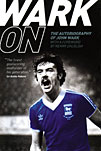 by John Wark
by John Wark
Know The Score, £18.99
Reviewed by Gavin Barber
From WSC 269 July 2009
Sometimes it’s the little details that point towards the most interesting aspects of a book. One does not expect the acknowledgements page of John Wark’s autobiography to thank Warner Chappell for permission to reproduce the lyrics to Shirley Bassey’s I Am What I Am. But sure enough, all three verses of Warky’s favourite song are there in the final chapter: we learn that he frequently gives it a spin on the stereo when he gets back from the pub. The image of the legendary hardnut cutting a tipsy rug to this well-known gay anthem is an unexpected one.
It isn’t only Wark’s tastes in music that indicate a man of contradictions. Early in the book we learn the sad story of his alcoholic mother’s death at the age of 57, a tale told with genuine heartache. Later on, however, an entire chapter is devoted to Wark’s own drinking exploits and those of his team-mates. While Wark’s carousing isn’t presented with any sense of laddish pride (in fact he issues a direct apology for one particular bout of pre-match excess), the sheer scale of the indulgence is, to say the least, a rather odd juxtaposition with his family story.
To those who grew up watching Ipswich in the 1970s and 1980s, this is a man so familiar it almost comes as a surprise to discover things we didn’t already know about him. Some of the stories – like a young Wark being rushed to hospital having nearly garrotted himself on a washing line while playing football in the back yard – are endearingly self-deprecating. Others are more predictable: few would be surprised to learn that Ipswich’s 1978 Cup final squad got rich selling their tickets, although the fact that Wark’s team-mate Clive Woods took a gun with him when delivering the tickets to the tout
probably didn’t get mentioned on that year’s Cup Final Grandstand.
The style is a bit rushed and rambling, like listening (appropriately enough perhaps) to a bar-room raconteur who’s got to get through all his anecdotes by closing time. One minute we’re learning about the corporal punishment dished out at Wark’s school; a few paragraphs later Bobby Robson is meeting him off the train at Ipswich station. There’s a remarkable story of playing success here – Wark was ostensibly the holding player in Ipswich’s Thijssen/Wark/Gates/Muhren diamond, and still managed to score 36 goals in the 1980-81 season. If it was told with a bit more patience then the book might come close to doing its subject justice but the sheer weight of words makes it a slog to pick out the gems – although Liverpool fans would be advised to persevere through the section on Wark’s Anfield career, for some eye-popping revelations about the club’s 1980s medical regime.
What comes through strongly is Wark’s unquestioning love for the game, from his wide-eyed excitement at his first childhood trip to Ibrox, right up to the present day: since retiring, Wark has clocked up over 200 Sunday league games. Like the man himself, the book may lack finesse but you can’t fault the enthusiasm.